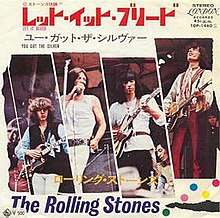Let It Bleed (song)
This article needs additional citations for verification. (May 2017) |
| "Let It Bleed" | |
|---|---|
 Japanese single picture sleeve | |
| Song by the Rolling Stones | |
| from the album Let It Bleed | |
| Released | 5 December 1969 |
| Recorded | 9 March – 10 June 1969 |
| Genre | Blues[1] |
| Length | 5:28 |
| Label | Decca Records/ABKCO |
| Songwriter(s) | Mick Jagger/Keith Richards |
| Producer(s) | Jimmy Miller |
"Let It Bleed" is a song by English rock band the Rolling Stones. It was written by Mick Jagger and Keith Richards and featured on the 1969 album of the same name. It was released as a single in Japan in February 1970.
Composition[]
The song opens with a slide piece and quickly moves into a solo acoustic guitar capo on the 3rd fret strumming the chords of A, D and E before bass, drums and piano join in, respectively. Wyman's autoharp can be heard somewhat faintly during the first verse with noticeable 'ping' sounds coming from it around the 0:40-0:50 mark but it is mostly inaudible throughout the track after the 0:55 ('she said my breasts') minute mark.
Reception[]
The lyrics include a number of drug and sexual references, including an invitation for "coke and sympathy," a reference to a "junkie nurse" and Jagger's suggestions that we all need someone to "bleed on," "cream on" and "cum on" them.[2] However, to Allmusic critic Richie Unterberger, the song is mainly about "emotional dependency," with Jagger willing to accept a partner who wants to lean "on him for emotional support."[2]
Unterberger also asserts that "Let It Bleed" may be "the best illustration" of the way the Rolling Stones make "a slightly sloppy approach work for them rather than against them."[2] He also praises Jagger's vocals, stating the song represents "one of his best vocals, with a supremely lazy approach that seems to be both affectionate and mocking at the same time."[2]
Personnel[]
Ian Stewart plays piano on this track (his only appearance on the album) while Bill Wyman plays autoharp.
- Mick Jagger – vocals
- Keith Richards – guitar, slide guitar
- Bill Wyman – bass guitar, autoharp
- Charlie Watts – drums
- Ian Stewart – piano
References[]
- ^ Eric v.d. Luft (2009). Die at the Right Time!: A Subjective Cultural History of the American Sixties. Gegensatz Press. p. 410. ISBN 978-1-933237-39-8.
- ^ Jump up to: a b c d Unterberger, R. "Let It Bleed". Allmusic. Retrieved 20 August 2012.
- The Rolling Stones songs
- 1969 songs
- Songs written by Jagger/Richards
- Song recordings produced by Jimmy Miller
- 1970 singles
- London Records singles
- Songs about drugs
- Songs about sexuality